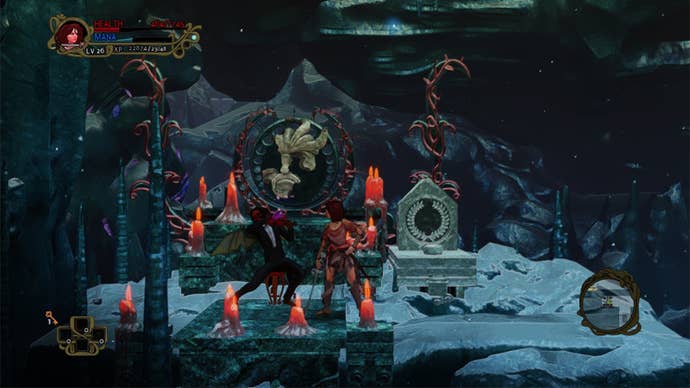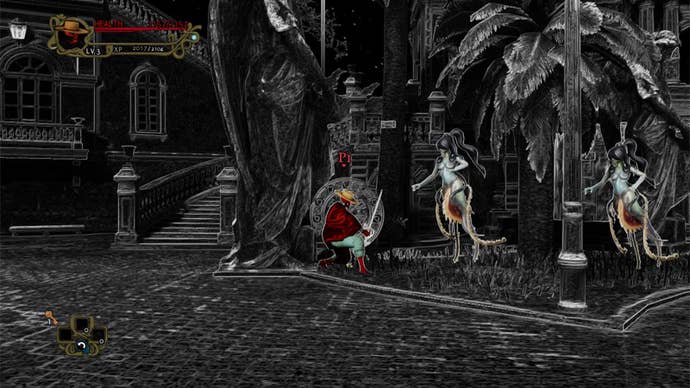Abyss Odyssey PC Review: Training Wheels
ACE Team's art nouveau-inspired dungeon-crawler makes for a perfect introduction to roguelikes, but veterans of the genre definitely won't find the challenge they're looking for.
This article first appeared on USgamer, a partner publication of VG247. Some content, such as this article, has been migrated to VG247 for posterity after USgamer's closure - but it has not been edited or further vetted by the VG247 team.
It's been a curious experience watching roguelikes continue their gradual takeover of gaming, especially in light of the poisonous reception the genre received upon its first exposure to a mass-market audience.
You only need to travel back to 2006, when Capcom loaded roguelike elements into their Trojan Horse of an open-world zombie game, Dead Rising. Understandably, players were confused. "What, you mean I have to restart this thing a bunch of times before I can actually finish it?" But, in recent years, thanks mostly to the grassroots success of Spelunky, we've grown accustomed to punishing games that shove us through a harrowing gauntlet of randomized elements, making every inch of progress a true achievement. Hell, at the time of this review's publication, USgamer's front page will feature reviews for two different roguelikes—we've come a long way, baby.

ACE Team's Abyss Odyssey marks the latest release in our recent wave of roguelike-mania, and, as expected, it offers the expected hooks: a randomized, multi-floor dungeon full of dangerous traps and deadly enemies, resources that disappear when you die, and a general focus on diving in over and over again until you get it right. And being an ACE Team production—the developer who previously brought us Zeno Clash and Rock of Ages—Abyss Odyssey wraps itself in a layer of beautiful surreality which offers some interesting touches you won't see anywhere else, like its stunning art nouveau character portraits and impossibly strange enemy designs. Frankly, I can't think of any other game that takes place entirely within a warlock's nightmare.
What separates Abyss Odyssey from the rest of the pack can be found in its fighting system, which trades the normally speedy combat of roguelikes into something more involved and technical. When you encounter enemies in the abyss, black borders emerge from the sides of the screen, locking everyone into a sort of Smash. Bros-style match until one side is defeated. And the Smash Bros. comparison isn't just me being reductive: There's definitely some direct inspiration at play, as Abyss' Odyssey's controls should be very familiar to anyone experienced at pitting famous Nintendo characters against each other. One button unleashes a basic attack, while a second button can be paired with any of the cardinal directions to perform one of four special moves. Abyss Odyssey actively discourages button-mashing, which means each enemy encounter—at first, anyway—requires careful attention to the opponent's actions and thorough knowledge of your character's abilities. If you told me ACE Team spent the majority of Abyss Odyssey's development working on the fighting engine, I'd believe you—battles are extremely responsive, and the game lets out a satisfying THWACK whenever one of your hits connects.
Abyss Odyssey distinguishes itself from other roguelikes in another notable way: Simply put, it's incredibly forgiving. Most games of the genre strip your character of all but their dignity upon death, but in Abyss Odyssey, you retain both your experience and gold, giving your character a definite advantage in the early stages of the abyss. In addition, the game offers plenty of second chances to ensure you won't be starting from the beginning too often. Merchants provide semi-affordable tokens that allow you to temporarily unlock checkpoints further down in the abyss, and, upon death, you're given control of a weaker soldier who can revive your character by locating her body on an easy-to-find altar. The second chances don't end there, though: By performing a special attack, you can assume the form of any enemy in the game, and switch to this new body at will, giving you a second life bar to work with. And if that wasn't enough, finishing one of the black-and-white bonus stages (marked on the map) provides a full health refill, as well as a new enemy soul to work with.

If you think this spirit of mercifulness sounds antithetical to the roguelike experience, congratulations: You've identified what prevents Abyss Odyssey from being truly great. The early stages of the game present the same tough choices that make roguelikes so addictive and rewarding: Should you buy that shiny, new sword and fight on for a few more levels, or play it safe and pay to unlock a new checkpoint instead? But, as your character begins to ascend experience levels, the healthy friction of roguelikes fades away, and the nail-biting excitement of surviving hellish dungeons transforms into a tedious anticipation of the inevitable. This affects battles, too, because after a certain point, you really don't have to put much effort into them anymore. In my final few runs through the abyss, I don't think I used the "block" button once, and I still plowed through weak swathes of enemies without breaking a sweat. And since the abyss only shuffles around a small amount of variables, exploring its depths turned into a "been there, done that" experience before I even saw the final floors.
That said, if you've never played a roguelike before, it's easy to see how Abyss Odyssey could be appealing—put in enough time, and you will finish it. I spent about 10 hours with the game, and managed to see the end in that short span of time. Compare that to my experience with Spelunky: Three years and countless hours later, and I've made an absolutely embarrassing lack of progress. Yet I still return to Spelunky time and time again, because I know it holds a wealth of content I'll have to fight tooth and nail to see. It's a shame that ACE Team misfired on this essential roguelike element, but there's still lot to like here—just be prepared to go on auto-pilot by the end.
VisualsAbyss Odyssey offers stunning art nouveau-inspired 2D graphics, and while this style doesn't translate as effectively to its polygonal models, ACE Team still manages to turn the standard dank dungeons into beautiful landscapes.
SoundThe atmospheric, eerie music evokes a real Castlevania feel, which is never a bad thing.
InterfaceThe fighting system—Abyss Odyssey's core element—feels fantastic and offers plenty of feedback, even if you don't have to play as effectively with a higher-level character.
Lasting AppealAfter you finish Abyss Odyssey, you probably won't feel the need to come back. There's plenty of characters to play as, but not enough shifting variables to make its randomized levels interesting.
ConclusionWondering what this whole "roguelike" thing is all about? Then Abyss Odyssey could be the game for you: It's a fine introduction to the rules of the genre, with some helpful training wheels to prevent newcomers from being discouraged. If you've suffered the scars of past roguelikes, though, you'll find Abyss Odyssey's lack of challenge a significant downside.
